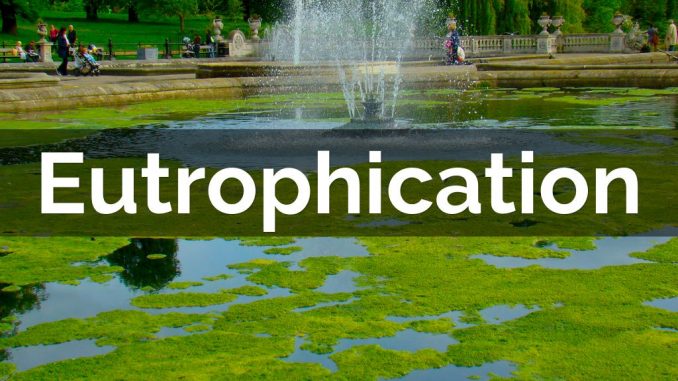
Eutrophication: undesirable effects and control measures
- Enrichment of water system with plant nutrients such as nitrate and phosphate is known as eutrophication.
- The word eutrophication refers to nutrient rich condition of water system.
- On the basis of nutrition status and productivity, water systems are classified as;
- Oligotrophic: water with poor nutrient content and poor productivity
- Mesotrophic: water with moderate nutrient content and moderate productivity
- Eutrophic: water with rich nutrient content and very high productivity
- Nitrate and phosphate are key plant nutrient. Therefore, if nitrate and phosphate enter into natural water system, they facilitates heavy growth of aquatic plants like algae causing Algal bloom.
- Waste water such as Sewage contains high concentration of nitrate and phosphate. Similarly, death of aquatic plants and animals also increases nitrate and phosphate content of water.
- Nutrition status of water system such as lakes gradually increases with increase in age of lake as they gradually changes from oligotrophic to eutrophic water system.
Undesirable effects of eutrophication:
- It facilitates rapid growth of aquatic plants causing algal blood. Growth of algae on surface of water prevents penetration of light into deeper layer.
- When aquatic life dies, microorganisms consume dissolved oxygen to oxidize their dead bodies. Loss of dissolved oxygen inhibits growth of aquatic organisms.
- Loss of dissolved oxygen creates anaerobic conditions that facilitates anaerobic decomposition of remaining organic matters. Compounds such as H2S, CH4, NH3 etc generated during anaerobic decomposition creates odor and taste problem in water.
- Over growth of algae and other plants causes clogging of water filters during water treatment process.
Control measures of eutrophication:
- Waste water like sewage should be discharge into river or other water system only after proper treatment. For example nitrate and phosphate should be removed from waste water before disposal into river.
- Algal bloom should be removed from water. Algae should not be disposed into water after killing them because it further generate plant nutrient during decomposition.
- Use phosphate free detergents to reduce eutrophication
- Growth of algae in water can also be controlled by applying algicides such as CuSO4.
- Prevents flooding of water from agricultural soil containing fertilizers to water system.
